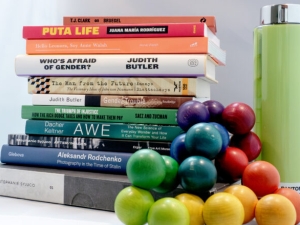

Research Bio
Grace Lavery's first book, Quaint, Exquisite: Victorian Aesthetics and the Idea of Japan, was published in 2019 from Princeton University Press. Quaint, Exquisite examines the ramifications for British aesthetic theory of the increased visibility of a non-European, but palpably modern, empire, in the wake of the opening of Japan. She argues that the idea of Japan catalyzed, diffused, and finally foreclosed a new investment in art for art’s sake, among both British aesthetes and Japanese ambassadors of culture working in Victorian institutions and genres. She also argues that the distinctive aesthetic and historical formulation of the idea of Japan – as both exquisite and quaint – continues to condition aesthetic discourse as such, long after its inception in the context of late Victorian inter-imperial rivalry.
Hercurrent book project, "Getting Better: Realism, Repetition, and the Rhetoric of Technique," explores the relationship between classic literary realism, especially in the work of George Eliot, and another modern genre: texts which offered practical instructions about apparently ineffable phenomena. Where Romantics had treated literary achievement as attained only by inspiration, Victorian realists insisted that it can – and must – be acquired through methodical labor, on the part of both writers and readers. “Getting Better” traces such rhetorics of technique through a range of realist and post-realist texts, revealing hitherto unexplored connections between Eliot’s fiction and various other discourses of asymptotic self-improvement, including: recovery narrative (“Janet’s Repentance” and Alcoholics Anonymous); psychoanalytic technique (Adam Bede and Freud’s Essays on Technique); the technique of brainwashing (Eliot’s ecclesiastical writings and work by and about cults); and sex tips (Romola, Middlemarch, and Marie Stopes). In light of these questions, she also reconsiders the controversial question of Eliot’s transgender identification, exploring the techniques associated with gendered literary styles, the gendered question of reference throughout Eliot’s fiction but especially in Middlemarch, and the discourse of transgender identity known, in our present moment, as “realness.” Deriving its method from narrative theory, queer theory, and the late work of Michel Foucault on “technologies of the self,” “Getting Better” offers a new account of the rhetoric of technique in Eliot’s work, and a new history of realism’s sedimentation into post-Bildung and secular narratives of growth.
When people refer to me, they use the pronouns "she," "her," and "hers."
Research Expertise and Interest
critical theory, gender and sexuality studies, Pacific, 19th century British literature, cultural studies

